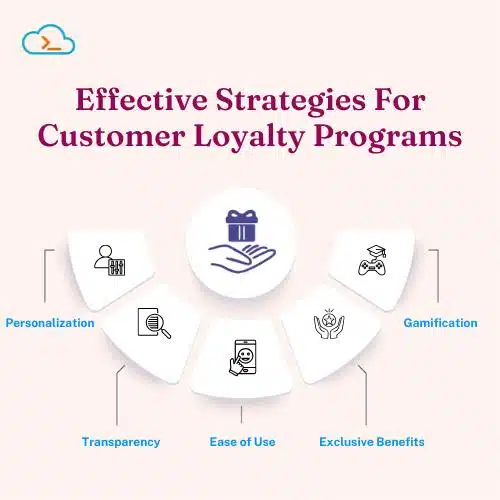By Rashmita Patro
Understanding Loyalty Programs
Loyalty programs are structured marketing tactics designed to incentivize customers to return to business. These programs offer rewards such as discounts, points, early entry to products, or store credit to customers who frequently engage with a brand. The motive of Loyalty Programs is to improve customer loyalty and enhance CLTV by creating long-term relationships and positive customer interactions.
Before delving deeper, let’s define some key terms:
- Customer Loyalty: A deep-rooted commitment to a brand or company, characterized by repeat orders and a strong emotional connection.
- Customer Lifetime Value (CLTV): The total profit a business anticipates earning from a single customer throughout their entire relationship with the company.
- Consumer Retention: The ability of a business to retain its existing customer base over time.
- Customer Acquisition Cost (CAC): The total cost associated with acquiring a new customer.
Why Retaining Customers is the Golden Key to Business Growth
Retaining existing customers is crucial for several reasons:
- By reducing Customer Acquisition Expenses: Loyalty programs prove to be a cost-effective investment. Acquiring new consumers is significantly more expensive than retaining existing ones, and the programs are a proven way to achieve this. This financial benefit can provide reassurance about the return on investment in loyalty programs.
- Increased Revenue: Customer loyalty leads to spending more money over their lifetime. They are more likely to make repeat buys, explore new products, and refer friends and family.
- Improved Profitability: Higher retention strategies directly translate to increased profitability for businesses.
- Enhanced Brand Reputation: Satisfied and repeat customers act as brand ambassadors, spreading positive word-of-mouth and building a strong brand image.
Loyal customer feedback provides relevant data that can be used to upgrade products, services, and overall customer experience. This involvement in the improvement process can make the audience feel empowered and part of the business’s success. Transform your web presence with the Best Digital Marketing Company in India, offering tailored solutions to boost your brand and drive results.
Do Loyalty Schemes Programs Influence Customer Retention?
Customer retention programs significantly impact casual customer retention rates by addressing key aspects of customer behavior:
- Encouraging Repeat Orders: By appreciating customers for their loyalty, businesses incentivize repeat orders and foster a habit of engagement. For instance, customers are more likely to return to a store where they can earn points for future purchases.
- Building Emotional Connections: Customer retention programs often create a sense of belonging and exclusivity. Programs that offer personalized rewards, early access to sales, or tailored incentives strengthen emotional bonds between businesses and their customers.
- Reducing Customer Churn: It refers to the rate at which customers stop doing business with a company. Repeat customers are less likely to switch to competitors. A well-structured Customer loyalty program acts as a barrier to churn by making customers feel valued and appreciated. This can make the audience feel secure about their customer base.
- Generating Valuable Insights: Customer Loyalty programs collect customer data and provide businesses with insights into purchasing habits, preferences, and behaviors. Predictive analytics from this data can be used to enhance consumer engagement strategies.
- Lowering Customer Acquisition Expenses: Retaining customers through reward programs is more affordable than acquiring new ones. Satisfied consumers are also more likely to recommend a brand, further reducing acquisition costs.
Elevate your online presence with Professional Digital Marketing Services designed to drive traffic, boost engagement, and grow your business model.
The Purpose Of Reward Programs
The ultimate purpose of reward programs is to build and sustain a loyal consumer base while enhancing consumer relationships. Customer Loyalty programs play a critical role in business strategies by:
- Fostering Loyalty: Encouraging repeat transactions and fostering a sense of trust between the brand and its customers.
- Enhance profits: Driving repeat buys and future buys to generate revenue and improve profitability.
- Enhancing Customer Engagement: Encouraging customers to interact with the brand frequently through rewards, incentives, and also through activities such as earning points, redeeming rewards, or participating in exclusive events.
- Improving Customer Satisfaction: Ensuring customers feel valued and rewarded for their patronage, leading to increased satisfaction and retention.
- Boosting Loyalty and Retention Rates: Loyal customers are more likely to stick with a brand, ensuring stable revenue streams.
- Driving Repeat Business: Encouraging customers to return for additional purchases through rewards.
- Improving Customer Lifetime Value: Maximizing the revenue generated from each consumer over their lifetime with the brand.

Effective Strategies For Customer Loyalty Programs
For Customer loyalty programs to succeed, businesses must adopt strategies, including:
- Personalization: Tailor rewards and incentives based on customer data to enhance relevance and engagement.
- Transparency: Clearly communicate the benefits and terms of the program to avoid confusion.
- Ease of Use: Simplify the process of earning and redeeming rewards to encourage participation.
- Exclusive Benefits: Offer perks such as early access to sales, free shipping, or special discounts to acknowledge customers. For instance, a clothing brand could offer seasonal sales for loyal customers, or a subscription service could provide free shipping for all orders over a certain amount.
- Gamification: Make retention programs fun and engaging by incorporating elements like badges, tiers, or challenges.
Partner with the Best Enterprise SEO Company in India to enhance your website’s visibility, drive organic traffic, and achieve scalable growth.
Key Takeaways
- Loyalty programs are strategic tools that transform casual customers into repeat buyers, driving long-term revenue and enhancing brand relationships.
- Loyalty programs are a cost-effective way to maximize customer lifetime value (CLTV), reduce churn, and boost profitability.
- In a crowded market, loyalty programs give businesses a competitive edge by building emotional connections, rewarding repeat customers, and enhancing brand reputation.
Conclusion
Customer Loyalty programs are a vital component of customer retention strategies. By rewarding customers, encouraging loyalty, and enhancing customer relationships, these programs drive return business and generate sustainable revenue. Businesses that effectively implement reward programs can reduce churn, improve customer satisfaction, and gain key takeaways into customer behavior, ensuring long-term success.
Frequently Asked Questions
1. How do loyalty reward schemes benefit businesses?
Loyalty reward schemes help businesses with frequent customers, enhance profits, and gain insights into customer preferences. By building loyalty, these programs also reduce customer acquisition expenses and enhance customer satisfaction.
2. What types of rewards can be included in a loyalty program?
Rewards can range from discounts, points, retail credit, and freebies to exclusive access to products, services, or events. Tailoring rewards to customer preferences enhances their effectiveness.
3. How can businesses assess the success of loyalty Schemes?
Success can be measured using key indicators such as customer retention rates, CLTV, repeat purchase rates, and program participation rates.

